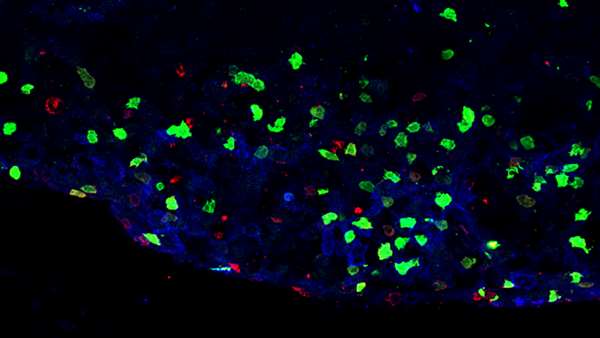Novel Immune Cell Population May Trigger Inflammation in Multiple Sclerosis and other Brain Disorders
A group of immune cells that normally protect against inflammation in the gastrointestinal tract may have the opposite effect in multiple sclerosis (MS) and other brain inflammation-related conditions, according to a new study by Weill Cornell Medicine and NewYork-Presbyterian researchers. The results suggest that countering the activity of these cells could be a new therapeutic approach for such conditions.
The researchers, who reported their finding Dec. 1 in Nature, were studying a set of immune cells called group 3 innate lymphoid cells (ILC3s), which help the immune system tolerate beneficial microbes and suppress inflammation in the intestines and other organs throughout the body. They discovered a unique subset of these ILC3s that circulate in the bloodstream and can infiltrate the brain—and, to their surprise, do not quench inflammation but instead ignite it.
The scientists called this subset inflammatory ILC3s, and found them in the central nervous system of mice with a condition modeling MS. Instead of constraining the immune response, this subset of ILC3s spurred another group of immune cells called T cells to attack myelinated nerve fibers, leading to MS-like disease symptoms. The researchers detected similar inflammatory ILC3s in the peripheral blood and cerebrospinal fluid of MS patients.
The researchers showed with a mouse model of MS that these inflammatory ILC3s in the brain function as antigen-presenting cells: They display bits of myelin protein, the main ingredient in the insulating layer around nerve fibers, to T cells—prompting them to attack myelin, causing the nerve damage that gives rise to disease signs. They found the inflammatory ILC3s in close association with T cells in regions of active inflammation and nerve damage in the mouse brains.
Finally, the researchers discovered that ILC3s that reside in other tissues in the body can be programmed, in effect, to counter the activity of brain-infiltrating T cells, preventing the MS-like condition disease in mice.
Ref:https://news.weill.cornell.edu/news/2021/12/novel-immune-cell-population-may-trigger-inflammation-in-multiple-sclerosis-and-other




ارسال به دوستان